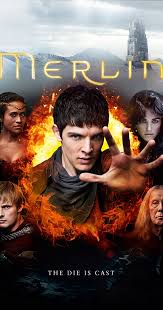Merlin
Background Information
Merlin, who is also referred to as "Merlin the Prophet-Magician" is a fictional magical figure created in the 12th century. Merlin is said to be the son of the Devil. The characters first appearance was in 1136 in "Historia Regum Britannia". He became popular in the middle ages and still to this day is a popular figure in literature, and other forms of pop culture. Some of Merlins most important attributes include the ability to "appear and disappear at will, read minds and change physical appearances"(1). Merlin is most closely tied with the character King Arthur, who he ultimately assists with the help of his magical powers. In mediaeval times, Merlin is "not a figure of legend but apparently documented, long-lost maker of British history" (1).
Merlin in French Mediaeval Literature
In 1155, the legend of Merlin becomes popular in French literature as well. The popularity stemmed from translations of "Historia Regum Britannia". The French translation that sparked Merlin's popularity in French culture was named Roman de Brut, translated by Robert Wace. It is said that the translation of this story in French would not have been as popular if it wasn't for the first extant account of the Round Table (2). Wace's translation of Historia inspired many French writers to write their own stories of Merlin, which became very popular. The first French writer to take advantage of the Merlin character in their own romance was Robert de Boron. This sparked a prolific number of Merlin romances to be written (2). Robert de Boron's account of Merlin was unlike the earlier accounts of Merlin, because it introduced a spiritual background for Merlin. This is said to reflect Boron's religious views.
Merlin in German Medieval Literature
With Merlin being popular all over the world, one of the places he was written about the most was Germany. The first time Merlin appears in medieval German literature is in a long verse romance called "Der Theure Morlin" (2). This poem was heavily influenced by the story written in France by Robert de Boron. This story came about a century after de Boron's story of Merlin. All over the world there is a usual agreement between everyone who writes about Merlin that he never dies. However, German author Johann has Merlin killed by the protagonist of one of his stories. This was seen as something very odd by readers who know the legend of Merlin. Johann is also the only author to focus more on Merlin having qualities of the devil, rather than good qualities.
Merlin in current pop culture
The legend of Merlin is still written, and talked about to this day. He continues to be a major figure in medieval style literature. In 2008 a television show titled, "Merlin" aired on BBC as a visual representation of the legend. The television show features, "the traditional narrative of mentor–student replaced by one involving a
servant–master dynamic" (3). While the television show does bring back old elements of the Merlin story, it also modernizes it to appeal to a more modern audience. The television show focuses a lot on the relationship between Merlin, and King Arthur. There are also recent books and plays that feature the character Merlin as well. His popularity has not died off since the middle ages. Merlin also appears in recent medieval videogames such as Runescape.
Works Cited
1. Lawrence-Mathers, Anne (2012). The true history of Merlin the magician. Yale University Press. Retrieved from www.jstor.org/stable/j.ctt32bwp5.
2. Weiss, Adelaide (1933). Merlin in German literature. The Catholic University of America.
Retrieved form https://babel.hathitrust.org/cgi/pt?id=uva.x000741444&view=1up&seq=1
3. Miller, Andrew (13 May, 2019). The avuncular master: the figure of Merlin and modern notions of meritocratic education. University of Illinois Press.
Retrived from http://eds.b.ebscohost.com.proxy-bloomu.klnpa.org/eds/pdfviewer/pdfviewer?vid=16&sid=66a07ffb-7a64-4b53-9e14-80a573442f7f%40sessionmgr101








No comments:
Post a Comment